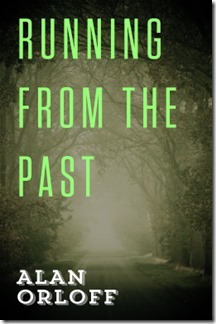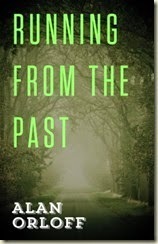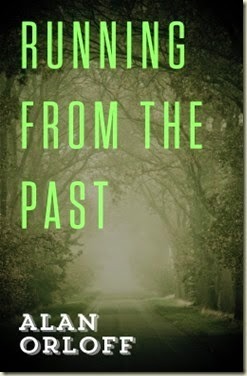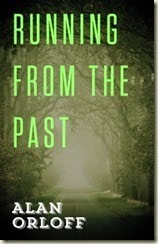Alan Orloff's Blog, page 2
August 20, 2015
Hello, My Name is…
How do you find the perfect name?
I open up a phone book (remember those?) and stab my finger blindly onto the page. That’s the name of my protagonist. Flip more pages and repeat for all the other characters.
Oh, if only it were that easy.
Character names are important to me, so I spend a lot of time thinking about them. Once in a long while, a name pops into my head that’s perfect. In THE TASTE, one of the secondary characters is named Bogart, and it took me about three seconds to come up with that one.
Usually, though, it’s a much more protracted process. With a character in mind, I’ll generate/brainstorm a list of names. As my list grows, somehow the character becomes more defined in my mind, and the disparity between the names I’m generating and the “perfect” name narrows.
After I’ve got a list of between ten and fifty names, I’ll go through and start eliminating. (And adding others, as I think of them). When I’ve narrowed it down to two or three, then I sleep on it.
And often, four days later, I’ll change the character’s name to something brand new. Naming characters is more of an art form than a science.
I agree with Meredith on many counts when it comes to naming characters (see her post on Monday). Like her, I’ll test drive a name for a while (even half a book!). If it doesn’t feel right, I have no resistance to changing it.
Like Meredith, it’s important to me that my characters have age-appropriate names, so I also use the SSA website to authenticate my names. And she’s right about getting sidetracked!
Also like Meredith, I try to avoid using character names that begin with the same letter. To keep track of things, I use a chart, with the letters of the alphabet down the left hand side and three other columns: male first names, female first names, and last names. I try to fill out each block in the grid before using the same initial letter in a name.
I also try to avoid names that rhyme: Jill, Bill, Will, Phil, McGill. And I try to vary the length of the names, too—can’t have everyone with a one-syllable name!
Last rule? No characters named Alan.
(This entry is “simul-posted” on Criminal Minds .)
July 23, 2015
A Little of Me, a Little of Someone Else
Is your protagonist really you?
How do you separate him/her from you?
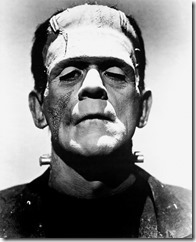 I am not my characters. I’m not a depressed stand-up comic. I’m not a rich workaholic. I’m not a radio talk show host. I’m definitely not someone who must eat human flesh to survive (at least I’m pretty sure I’m not).
I am not my characters. I’m not a depressed stand-up comic. I’m not a rich workaholic. I’m not a radio talk show host. I’m definitely not someone who must eat human flesh to survive (at least I’m pretty sure I’m not).
I am my characters. I laugh. I cry. I strive to be a good person. I get annoyed. I’m rude (not very often, but it happens!). I know what it’s like to wait in line to buy a ticket, and when I get to the front, they’re sold out. I hate traffic. I like cake (actually, I love cake).
Sometimes I even talk out of both sides of my mouth (just like my characters!).
Of course, I don’t consciously try to pattern my protagonists after myself. I mean, who in their right mind would want to read about me? I’m dull (seriously). Readers would be bored after a page and a half. And I don’t try to write characters who are simply an exaggerated version of me. That just seems weird and egocentric. Introducing Alvin Worloff, the smartest, funniest, most interesting man in the world. He doesn’t drink beer often, but when he does, it’s Dom Perignon! There he goes on his jetpack to rid the world of talking velociraptors!
Um, no.
On the other hand, how can my characters be anything but me, at least on some level? I mean, they emerged from my head; their actions are informed by my thoughts, experiences, and emotions. Their every thought is filtered through my lens. They have to be part of me, almost by definition.
Sure, I do my best to portray them as being unique individuals, unlike me for the most part. Give them a different set of values, have them believe in stuff I don’t. Make them do things I would never, ever, ever do (cannibalism comes to mind). But I think if you’ll examine any of my characters, you’ll recognize at least some aspect of me, no matter how hard I try not to let any of my DNA creep in.
But what should I expect? I created them.
(This entry is “simul-posted” on Criminal Minds .)
June 25, 2015
Eyes Open! Stay Awake!
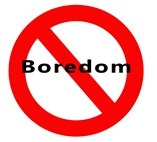 Sometimes you become so interested in the research for your book that it takes over the story. What do you do to keep it from becoming a treatise that only serves to make your readers’ eyes close with boredom?
Sometimes you become so interested in the research for your book that it takes over the story. What do you do to keep it from becoming a treatise that only serves to make your readers’ eyes close with boredom?
Some people, old roommates mostly, call me lazy. I prefer the term efficient. I don’t like waste, be it energy, food, money, brainpower, or time (especially food).
I know a lot of writers enjoy spelunking in the proverbial stacks, unearthing long-forgotten historical tomes. Their jaws drop in wonder at a newly-discovered journal from the 1300’s or a never-before-seen map of the ancient Roman empire.
I’m not one of them. I strive to do exactly as much research as necessary and not one iota more. I don’t think I’ve ever been accused of including too much research in any of my books or stories. Ever. Really, EVER.
Readers don’t need to know how the sausage is made. They just need to know that one of my characters has stopped at a street vendor to get a delicious brat on a bun.
Don’t get me wrong, I work hard to make sure that what I write is as accurate as possible and, in order to do that, research must be conducted. It’s just not my favorite thing. That’s why I rarely worry about bombarding my readers with all kinds of arcane knowledge. I try to give them just what they need to understand whatever is going on in my book.
I operate on a simple plan: if it serves the story, it goes in.
If it doesn’t, it doesn’t.
*****
Still a few more days left in Amazon’s The Big Deal sale! More than 350 Kindle books for up to 85% off, including RUNNING FROM THE PAST for only $1.99!
(This entry is “simul-posted” on Criminal Minds.)
April 18, 2015
Every Day is an Education
What are three things you know now that you didn't when you started as a fiction writer?
1. Writing is easy. Writing something that is good, that other people want to read, that other people want to represent, that other people want to actually spend hard-earned money on? That is HARD. But as my father used to say, if it was easy, everybody would be doing it.
2. Writing is subjective. REALLY subjective. Before I began writing, I knew, on some level, that not everyone liked the same books (substitute: movies, songs, flavors of ice cream, Spice Girls). But I sorta figured that most people didn’t have wildly divergent opinions about the same work. Boy, was I wrong! It’s amazing to me how two people can feel totally different about the same book or story. “How can any self-respecting publishing house put out this dreck?” versus “That’s the best book I’ve read all year.” And that happens more often than you might think. Of course, this is a good thing (usually).
3. Before I began writing fiction, I’m not sure I even knew anybody who claimed to be a writer. (You know, those unkempt weirdos always mumbling to themselves and gesturing insanely in the air—I steered clear.) Now I know plenty of “writers,” and they are the most intelligent, witty, fascinating, generous, friendly, engaging, erudite (look it up, people!), welcoming, gregarious, and informative people I’ve ever met. Did I mention how welcoming they are? It’s difficult to be a wallflower at a mystery convention no matter how hard you try, trust me. (Based on the above description, I’m not sure I belong, but if you don’t tell anybody, I won’t!) I mean, it’s actually COOL to be a writer!
3A. Writers drink. A lot. Especially mystery/thriller writers.
(This entry is “simul-posted” on Criminal Minds.)
March 5, 2015
Thanks for the Support!
 My new release, RUNNING FROM THE PAST, came out Tuesday.
My new release, RUNNING FROM THE PAST, came out Tuesday.
I don’t much like crowds.
Not at the mall. Not at concerts. Not at sporting events.
I was never one to run with the crowd, either. Growing up, I usually gravitated toward a small group of friends, and I pretty much did what I wanted—no peer pressure steered me (or so I thought, anyway).
But recently, I’ve come to like the crowd, especially the “crowd” in crowdsourcing.
Because that’s, in part, how my latest book got published.
A little background: I had this book I’d finished. I really liked it, but my agent at the time couldn’t really envision a place where it might “fit.” As an experiment, we put it up on Wattpad (a share-your-work site), which required me to get a cover, so I bought one from a professional cover designer. It got a fair number of reads on Wattpad, but I took it down after a while, and it ended up sitting on my hard drive while I worked on other projects.
Fast forward to last fall, when Amazon announced its new crowdsourcing program, Kindle Scout. Conceptually, it’s a little like American Idol for books. To enter, all you need is a finished manuscript (in one of three genres) and a cover.
So I figured, why not? No downside, really.
I submitted my package, and after being approved, I put an excerpt up on their site for 30 days (along with many other writers). Then readers (dubbed Kindle Scouts) perused the selections and nominated those books they’d like to see get published.
After the campaign was over, books with the most nominations got reviewed by Amazon staff. Using an undisclosed evaluation process, books were then selected for publishing, and I was fortunate enough to get a contract from Amazon’s new imprint, Kindle Press. I’m convinced that my success was due to a tremendous amount of support from my friends—in real life, on Facebook and Twitter, and elsewhere.
So, thanks friends!
The contract seemed fair enough: an advance (modest), 50% royalties on ebooks, potential sales of audio and translation rights (I kept print rights—a trade paperback is forthcoming!). But what really piqued my interest was Amazon’s promise of marketing. Say what you will about Amazon (and I have absolutely only good things to say about them!), they know how to sell books.
So far, everything has been great. I got a very thorough, very professional copyedit. And things have gone smoothly with the rollout.
As for promotional efforts, when Amazon talks, people listen. Their initial press release announcing the publication of the first group of Scout books was picked up by many on-line publications/websites, including: PC Magazine, Publishers Weekly, Digital Book World, Christian Science Monitor, Geekwire, Entrepreneur Magazine, MarketWatch, and Entertainment Weekly.
Of course, whether all this early buzz leads to sales is anybody’s guess. Right now, I suppose it’s more of a curiosity to most people than anything else (Crowd-sourced books? Preposterous!).
I guess only time will tell.
And the reaction of the crowd, of course.
(This entry was “simul-posted” on Criminal Minds.)
March 4, 2015
Will You Review?
My book came out yesterday, and today I’m faced with a task I’m ambivalent about: soliciting reviews (believe it or not, it's hard for me to ask people for things). Are there any reviewers/book bloggers out there who would like a complimentary review copy? Please let me know and I’ll “gift” you the Kindle version.
And while we’re on the topic of reviews, Amazon reviews also are important, to the author (and publisher), as well as to other readers who use these reviews when deciding if a book might be something they would enjoy. So, please, if you’ve read a book lately, consider taking a few minutes to leave a thoughtful, honest review, on Amazon or elsewhere.
This author thanks you!
March 3, 2015
PUB DAY!
March 2, 2015
Tomorrow!
(To the tune of Tomorrow from ANNIE)
Myyyy book’ll come out,
Tomorrow,
Bet your three-and-a-half dollars,
That tomorrow,
My book can be read.
Justttt thinkin’ about,
Tomorrow,
Gets me all excited,
That by tomorrow,
I’ll be outta my head.
Myyyy book’ll come out,
Tomorrow,
So you gotta hang on,
Til tomorrow,
Just one more day.
Tomorrow!
Tomorrow!
Unless
You want to
Pre-order it
Todaaayy!!
February 19, 2015
Which Way Did I Go?
Are you an outliner or a seat-of-the-pantser? Have you ever tried to do it the other way? What happened?
I graduated college with a degree in mechanical engineering. I like plans, schematics, and spreadsheets. Formulae, laws of physics, straight lines, sharp corners, curves described by elegant mathematics. I believe in ORDER.
My name is Alan, and I’m an outliner.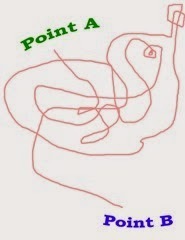
If I tried to write something without an outline, I have full confidence it would devolve rapidly. I’d start writing a scene, and everything would be fine for a few minutes, but before too long it would go flying off the rails. For instance, have you ever had an argument with someone, but ten minutes later, you’ve miraculously switched positions? Which reminds me of a book I read once, where the characters’ back stories kept shifting, making following the chain of events difficult, at best. Not as difficult as rocket science, but still hard. Did you ever wonder how these advanced 3-D rendering technologies have changed the way engineers design rockets? And rockets are way, way cool. Maybe I should write a book about people hijacking a rocket and settling on Mars. Mmmm, Mars. I do like their chocolate. And if anyone is interested, I prefer dark chocolate. I understand it’s actually healthy for you. And I’m all about the health. Hey! Squirrel!
But I digress. (If you couldn’t tell, I often write these blog posts by the seat of my pants.)
Now, where was I?
Oh, yes. Outlining. I outline, but when I say I “outline,” it’s not like how we were taught in third grade. Nothing formal whatsoever—no Roman numerals, no subsection 12-G-IV-c, no indenting. First, I map out how the story begins. Then I plot out how the story ends. I also like to pencil in some of the major turning points along the way. Then I fill in the scenes that connect these “tent poles.”
Sometimes I have a good idea what a scene should contain, but often my outline consists of little more than: “Scene 14: Joe and Sue meet in the old chemical plant. Joe tells her something shocking, and Sue runs off, slips, and falls into a vat of hydrochloric acid.”
I should make it clear that I’m not a slave to my outline. I view it as a living, almost-breathing entity. When things change (and boy, do they ever), I change right along with them (or should I say, I change my outline right along with them). In my writing workshops, I tell outliners that if things aren’t working, consider changing your outline. (Similarly, I tell pantsers they need to change their pants (ba-da-bing!).)
Sometimes I wish I had the ability to just sit down and start writing (with the reasonable expectation of producing something decent). That’s right, on some level, I envy the pantsers. So carefree. So happy-go-lucky. So…Bohemian.
But even if I did write more by-the-seat-of-my-pants, I don’t think anyone would ever confuse me with a free-wheeling, spontaneous artiste. And that’s something I’ll just have to learn to live with.
(This entry is “simul-posted” on Criminal Minds.)
February 5, 2015
It is Fun to Have Fun (But You Have to Know How)
Sophie Hannah continued Poirot and Sebastian Faulks continued Bond. What character would you most like to write about, if the estate asked you?
The idea of taking over for a deceased writer is not a new one to me. When I was in sixth grade, my best friend John and I decided to write a sequel to WAR OF THE WORLDS. (I have to admit, we didn’t bother securing the rights from the HG Wells estate; we forged ahead anyway.) We finished about three pages before we took a break to play basketball. That break lasted decades. (I'm happy to say John is still one of my most valued advance readers.)
I think there would be a ton of pressure if you took over a successful/beloved series. Unless you totally nailed it, a lot of people would have issues with something or other. And if you’ve ever read a thread on any Internet forum or social media site, you know that most of those people with strong opinions are not shy about sharing them. Repeatedly. AND LOUDLY. AND DID I SAY REPEATEDLY AND LOUDLY????
I would have loved to take over one of Robert B. Parker’s series, but others beat me to it (not that I would have been asked anyway!). Ace Atkins does a great job carrying on the Spenser series, and my pal and terrific writer, Reed Farrel Coleman, has taken over the Jesse Stone series.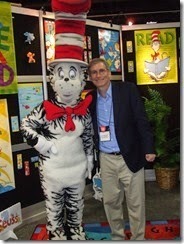
There is one other character I’d love to write about and I think I’d do a pretty good job—the Cat in the Hat (see photo: I even met him!). So if there happen to be any representatives from the good doctor’s estate reading this blog, please consider the following recent Facebook post as my “audition.” (I await your call.)
Go, Go, Snow
I do not like it on the streets,
I do not like it on my feets,
I do not like it on my hair,
I do not like it anywhere,
I do not like it on the ground,
I do not like it in a mound,
I do not like snow, not one iota,
I guess I should move to Sarasota.
(This entry is “simul-posted” on Criminal Minds.)

